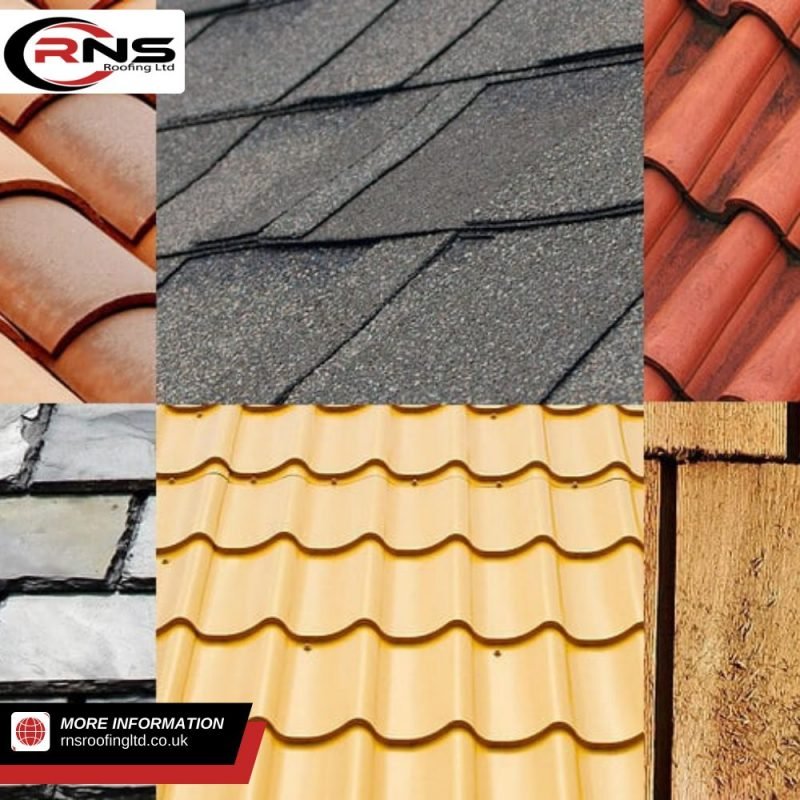Replacing your roof is a significant investment. You want to choose a material that suits your needs, budget, and home style. From asphalt shingles to slate and metal roofing, the options can be overwhelming. So, how do you determine the best types of roofing materials for your situation?
This guide explores the most common residential roofing materials. We’ll discuss their pros and cons, including cost, durability, maintenance needs, and appearance. You’ll also learn which materials are best suited for different architectural styles and climates. With this knowledge, you can confidently select a new roof that protects your home for decades while complementing its design.
Asphalt Shingles: The Most Popular Residential Roofing Material
Asphalt shingles are the most common roofing material for residential homes in North America and are gaining popularity in the UK. Made of fibreglass mats saturated with asphalt and topped with mineral granules, they provide an affordable, versatile roofing solution.
Types of Asphalt Shingles
There are two main types:
- Three-tab shingles: These have a flat appearance with tabs creating a uniform look.
- Architectural shingles: These have a more textured, dimensional appearance, emulating wood or slate, and typically last longer.
Pros:
- Affordability: Asphalt shingles are among the most cost-effective options.
- Ease of installation: Quick to install with minimal structural reinforcement.
- Variety: A wide range of styles, textures, and colours to suit any home.
- Durability: Withstands weathering, impact, and UV rays, lasting up to 30–50 years.
Cons:
- Shorter lifespan compared to metal or slate roofs.
- Environmental impact: Asphalt shingles are not recyclable.
Best for: Traditional homes, new builds, and renovations on a budget.
Metal Roofing: A Durable and Energy-Efficient Option
Metal roofing is becoming increasingly popular, particularly for its durability and sustainability. Available in materials such as galvanized steel, aluminium, copper, and zinc, metal roofs can last 50-100 years.
Pros:
- Durability: Resistant to rust, fire, and insects.
- Energy efficiency: Reflects sunlight, reducing heat build-up and energy bills.
- Eco-friendly: 100% recyclable and often made from recycled materials.
- Weather resistance: Withstands high winds, heavy rain, and even snow, ideal for UK climates.
Cons:
- Upfront cost: More expensive than asphalt shingles.
- Noise: Can be louder in heavy rain unless adequately insulated.
Best for: Modern homes, eco-conscious homeowners, and areas with extreme weather.

Roofing Tiles: An Elegant and Long-Lasting Choice
Roofing tiles, particularly clay and concrete, are highly durable and long-lasting, with some tile roofs lasting up to 100 years. These materials offer excellent protection from harsh weather and are resistant to rot, fire, and insects.
Types of Tiles:
- Clay tiles: Known for their rustic, handcrafted appearance.
- Concrete tiles: More affordable than clay and can mimic other materials like wood or slate.
Pros:
- Longevity: Tile roofs can last for several decades.
- Curb appeal: Available in various styles, textures, and colours, tiles enhance any home’s appearance.
- Low maintenance: Resistant to most forms of weather-related damage.
Cons:
- Cost: Tiles are more expensive than asphalt shingles.
- Weight: May require additional structural reinforcement due to their heaviness.
Best for: Mediterranean-style homes or properties looking to enhance their curb appeal.
Slate Roofing: Natural Stone Beauty With Unmatched Durability
Slate roofing is a prestigious choice, known for its natural stone beauty and durability. Slate roofs can last up to 200 years, making them one of the longest-lasting roofing options available.
Types of Slate:
- Sea green slate: Blue-grey, a mid-range option.
- Vermont slate: Durable, available in various colours such as grey, green, and purple.
- Spanish slate: Has a unique reddish tint, though slightly less durable.
Pros:
- Longevity: Lasts up to 200 years.
- Appearance: Adds a natural, classic aesthetic to any home.
- Durability: Resistant to weather, rot, and insects.
Cons:
- Weight: Requires a strong structure to support the roof.
- Cost: Slate roofing has a high upfront cost but is a long-term investment.
Best for: Heritage homes, historic restorations, and homeowners seeking an elegant, timeless look.
Composite Shingles: The New and Improved Asphalt Shingle
Composite shingles are a modern improvement on traditional asphalt shingles, combining the benefits of durability, fire resistance, and affordability.
Pros:
- Cost-effective: Composite shingles are cheaper than slate and tile.
- Variety: Mimics the look of wood, tile, or slate.
- Durability: Composite shingles can last up to 50 years with proper maintenance.
- Ease of installation: Requires minimal structural support and can be installed quickly.
Cons:
- May fade: Composite shingles can discolour over time.
Best for: Homeowners seeking a stylish, low-maintenance, and affordable roofing option.
Conclusion
As you can see, selecting a new roof is an important decision with many factors to consider. Do your research on the pros and cons of different materials like asphalt, metal, slate, and tile. Think about your needs for durability, longevity, style, and budget. Asphalt and metal tend to be the most affordable and durable. Slate and tile last longer but cost more.
Once you determine the right material for your home and needs, find a reputable roofer to install it properly. A high-quality, well-installed roof will protect your most valuable asset for decades to come. With so many excellent options available today at a range of price points, you can choose a roof that balances your practical and aesthetic needs. Make this critical choice carefully and you’ll enjoy the results for years to come.
People Ask Questions About Types of Roofing Materials
What are the most common types of roofing materials?
The most common types of roofing materials include asphalt shingles, metal roofing, wood shakes, clay tiles, and slate.
What factors should I consider when choosing a roofing material?
Consider factors such as durability, cost, aesthetics, climate suitability, and maintenance requirements when choosing a roofing material.
How long do asphalt shingles typically last?
Asphalt shingles usually have a lifespan of 20 to 30 years, but this can vary based on factors like climate and maintenance.
What are the advantages of metal roofing?
Metal roofing is durable, lightweight, and resistant to fire, insects, and rot. It also has a long lifespan, often exceeding 50 years.

